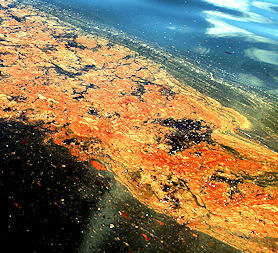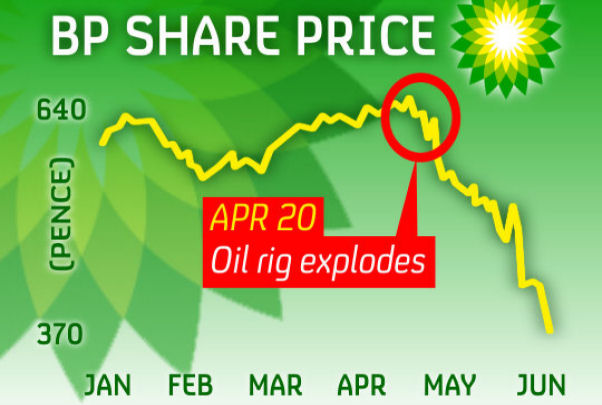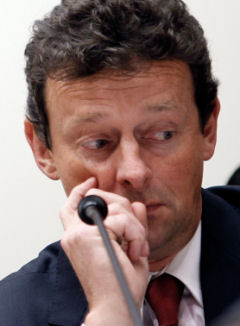Deepwater oil spill: the cost to BP
Eleven workers killed, nearly five million barrels of oil in the sea, a 20 billion dollar fund to cover the damage – the cost of the Deepwater Horizon disaster goes beyond pounds or dollars.
For Tony Hayward, the company’s outgoing chief executive, the price of the catastrophe has been his job. But damage to the BP brand as a whole could be as catastrophic as the environmental impact.
The firm’s reputation in the US is at an all-time low, the cost of the clean-up has passed $6bn (£3.8bn), share values have taken a beating and Americans with homes and businesses along the Gulf coast – in Louisiana, Mississippi, Alabama and Florida – have demanded payback.
In June President Obama said “We will make BP pay for the damage it has caused.”
It was then announced that BP had agreed to put aside $20 billion into an escrow fund (an account held by an independent third party) to deal with the continued fallout from the oil leak. That figure is not capped and could increase again.
“BP’s liabilities for this spill are significant,” Obama told reporters.
But he described the company as strong and viable, adding: “I’m absolutely confident BP will be able to meet its obligations to the Gulf Coast and to the American people.”

BP spill bill
BP has placed an initial £20bn into an "escrow" account to ensure the oil company will cover the expenses of the Gulf spill. Channel 4 News explains how it works.
What is an escrow account?
An escrow account is an account or fund held by an independent, third party - usually a law firm - that is based on a written agreement to deposit money in monthly or annual instalments in trust for others (in this case for victims of the oil spill).
How much could the fund be worth?
54 Democratic senators called on BP to put an initial $20bn into an escrow account. Credit Suisse estimates that total costs of the oil spill could mount to as much as $37bn. BP has already paid out $85m worth of claims.
What if BP says no to more payments?
BP has shown willing to cover the cost of the spill to date, however if the company refuses to bow to Obama, the US president has the legal authority to force the oil giant out of the claims handling process.
A White House official said: "The president has the authority under existing law to assure that the legal obligation of the responsible party have been satisfied.
"We are satisfied that ... the president can use this authority to accomplish the purposes served by an escrow fund and independent claims payment procedure."
The explosion on the Deepwater Horizon rig which began the crisis took place on 20 April. It was not until 87 days later that the huge spill was finally capped after numerous failed attempts.
Initially the company was spending around $18m per day on efforts to control the spewing oil. Shortly before the spill was finally stopped on 15 July that had risen to more than $35m per day.
BP has been deluged by claims from people with homes and businesses affected by the leak, with tens of thousands of calls to its helpline and £40m already handed out as compensation for “economic injury”.
Sinking feeling
The group revealed a £20.8bn blow from the spill in second-quarter figures at the end of July although the oil giant is also likely to be hit with further fines and penalties running into billions of dollars.
Share values plummeted after the disaster, wiping an initial £40bn off the company’s market value.

Before the explosion, BP accounted for six per cent of the FTSE 100 with a dividend worth £6.9bn a year.
In June BP’s chairman, Carl-Henric Svanberg, confirmed fears that the company would not pay dividends to its shareholders for the rest of 2010.
BP directors are believed to have canvassed shareholder opinion on whether to break up the oil giant following the oil spill crisis.
Options for a “Future BP” include restructuring the business by selling its refineries and petrol stations as well as scaling back operations in America and bringing engineering in-house.
BP cuts dividend, reduces investment and sells $10bn of assets
In a conference call in early June Tony Hayward and BP chairman Carl-Henric Svanberg went to great lengths to reassure investors that they had plenty of firepower to not only meet the costs of the operations in the Mexican Gulf but also meet its other commitments, writes business correspondent Siobhan Kennedy.
While they didn't specifically say they would pay the dividend they left investors with no doubt they had the money to do so, it was just a question of prioritising the Mexican Gulf spill first.
Yet just one week later under pressure from President Obama to put aside a massive $20bn fund, the company decided it no longer had the cash reserves to meet all its costs and pay the dividends.
The payments for the quarter are expected to be about $2.5bn and the company chairman discussed a number of options with investors on a conference call including the temporary suspension of the dividend.
But while most investors, who have been broadly supportive of Tony Hayward's management, have factored in a cancellation of the payout for one quarter, few were expecting it to be wiped out for the rest of the year. One investor told Channel 4 News last week that if the dividend was cancelled he would likely pay for it with his job.
It's clear that Obama's decision to push BP to put aside such a huge amount of funds has forced BP's hand. BP had almost bragged about its available cash reserves - $5bn in ready cash and a further $10bn in facilities - yet having to set aside more than that for the liability fund clearly BP was left with no choice but to rein in its spending including its dividend.
Exxon and on
BP, alongside Transocean Ltd and Halliburton Co, have been ordered to keep hold of all their paperwork for legal investigation.
Under current US laws, BP is only expected to bear the cost of $75m of damages – although some analysts say Congress may now boost that to $10bn. Any cap on damages paid would of course disappear if BP was to be found negligent.
The legal bill for Exxon after the Valdez oil spill in 1989, previously the worst oil spill in US history, was reduced to $507.5m with $500m in interest payments.
The company had originally set aside $5.4bn for legal settlements, with the clean-up costs ringing in at $3.4bn.

Hayward exit
Tony Hayward is stepping down as chief executive by “mutual agreement”. After 28 years with the company. He is expected to be offered a non-executive director role with BP’s Russian joint venture TNK-BP.
He had faced serious criticism over his handling of the US oil spill, following a number of gaffes including his comment of: “I want my life back”.
Mr Hayward’s exit package is believed to be worth up to £12m, which would comprise of a year’s salary, which last year was £1.045m, alongside his pension pot which after almost three decades at BP will have swelled to an estimated £10.84m by the end of the year.
He is replaced by his US colleague Bob Dudley, who is currently in charge of the clean-up operation.




